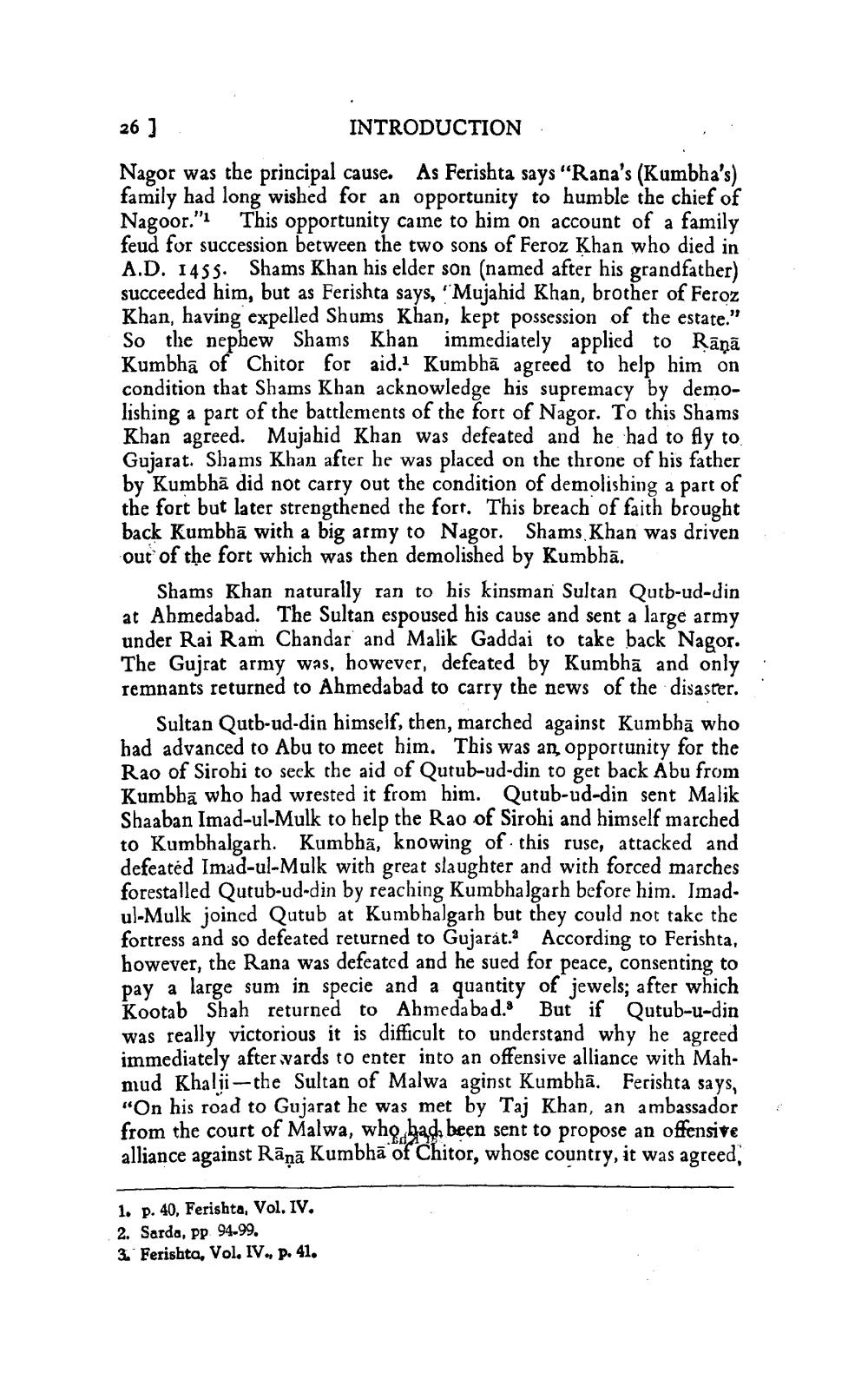________________
26 ]
INTRODUCTION
Nagor was the principal cause. As Ferishta says "Rana's (Kumbha's) family had long wished for an opportunity to humble the chief of Nagoor."1 This opportunity came to him on account of a family
feud for succession between the two sons of Feroz Khan who died in A.D. 1455. Shams Khan his elder son (named after his grandfather) succeeded him, but as Ferishta says, "Mujahid Khan, brother of Feroz Khan, having expelled Shums Khan, kept possession of the estate." So the nephew Shams Khan immediately applied to Rāņā Kumbha of Chitor for aid. Kumbha agreed to help him on condition that Shams Khan acknowledge his supremacy by demolishing a part of the battlements of the fort of Nagor. To this Shams Khan agreed. Mujahid Khan was defeated and he had to fly to Gujarat. Shams Khan after he was placed on the throne of his father by Kumbha did not carry out the condition of demolishing a part of the fort but later strengthened the fort. This breach of faith brought back Kumbha with a big army to Nagor. Shams Khan was driven out of the fort which was then demolished by Kumbhā.
Shams Khan naturally ran to his kinsman Sultan Qutb-ud-din at Ahmedabad. The Sultan espoused his cause and sent a large army under Rai Ram Chandar and Malik Gaddai to take back Nagor. The Gujrat army was, however, defeated by Kumbha and only remnants returned to Ahmedabad to carry the news of the disaster.
Sultan Qutb-ud-din himself, then, marched against Kumbha who had advanced to Abu to meet him. This was an opportunity for the Rao of Sirohi to seek the aid of Qutub-ud-din to get back Abu from Kumbha who had wrested it from him. Qutub-ud-din sent Malik Shaaban Imad-ul-Mulk to help the Rao of Sirohi and himself marched to Kumbhalgarh. Kumbha, knowing of this ruse, attacked and defeated Imad-ul-Mulk with great slaughter and with forced marches forestalled Qutub-ud-din by reaching Kumbhalgarh before him. Imadul-Mulk joined Qutub at Kumbhalgarh but they could not take the fortress and so defeated returned to Gujarat. According to Ferishta, however, the Rana was defeated and he sued for peace, consenting to pay a large sum in specie and a quantity of jewels; after which Kootab Shah returned to Ahmedabad. But if Qutub-u-din was really victorious it is difficult to understand why he agreed immediately after wards to enter into an offensive alliance with Mahmud Khalii-the Sultan of Malwa aginst Kumbha. Ferishta says, "On his road to Gujarat he was met by Taj Khan, an ambassador from the court of Malwa, who had been sent to propose an offensive alliance against Rāņā Kumbha of Chitor, whose country, it was agreed,
1. p. 40, Ferishta, Vol. IV.
2. Sarda, pp. 94-99.
3. Ferishta, Vol. IV., p. 41.




